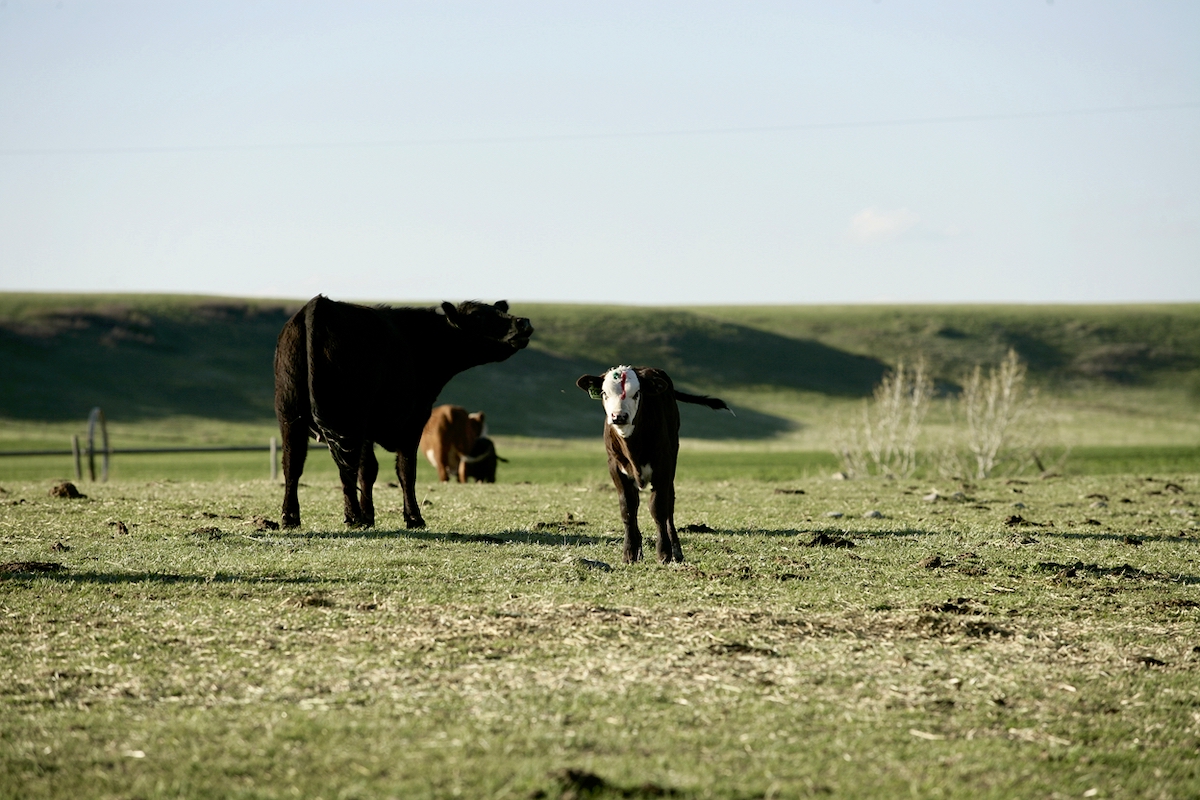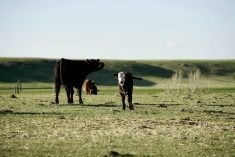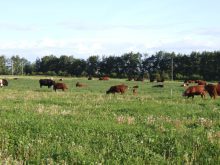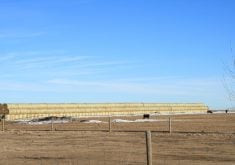It sounds like science fiction but you will soon be able to test a newborn’s DNA as a baseline for future detection of potentially chronic conditions such as Johne’s disease and bovine respiratory disease (BRD) and even BSE to get an early jump on treatment, all from a single blood sample.
The technology will be offered in Canada by CNA Diagnotics, a Calgary-based company formed by lead scientist Dr. Christoph Sensen and several well-known Canadians in cattle circles.
Sensen is also working with others to employ this technology for early detection of disease in humans.
Read Also

Body condition, nutrition and vaccination for brood cows
One of the remarkable events of the past century related to ranching has been the genetic evolution of brood cows….
While he is currently a professor at Graz University of Technology in Austria, his expertise in this field was gained during a 20-year research career in Canada, 14 of which were spent is in Calgary where he was a professor of bioinformatics at the University of Calgary’s faculty of medicine. There he participated in large genomic research projects including two for the development of markers for BSE and chronic wasting disease funded by the Alberta Livestock and Meat Agency.
You read correctly. There is the possibility of a test to screen live animals for BSE. CNA Diagnostics filed a pre-patent application for the potential markers almost two years ago. Sensen says there are 300 known markers that could be used to detect classical BSE in live animals as early as 10 months before clinical signs can be observed.
In explaining the company’s new DNA test, Sensen says cells die and disappear every second of every day without causing disease in the body. This normal process called apoptosis, or programmed cell death, clears the body of old, damaged and junk cells. Golgi apparatus within cells of mammals collect, package and ship garbage out of cells through the bloodstream to the liver where the body gets rid of it. DNA from diseased and dying cells is packaged in tiny lipid spheres that circulate in the bloodstream, most likely signalling other body tissues for help.
Sometimes cells that should be eliminated persist and grow in number, resulting in tumours. Conversely, if apoptosis speeds up, too many cells self-destruct leading to tissue damage that is often behind neurodegenerative disorders.
The CNA Diagnostic test works very much like a DNA parentage test except blood samples will be analyzed to detect specific disease markers in the lipid spheres shed by disease cells.
“As far as a test goes, DNA is stable (samples won’t deteriorate before getting to the lab), highly informative and readily available from serum,” Sensen says.
“To be useful in everyday animal agriculture, a screening test needs to be relevant to the needs of producers and it has to be designed to screen large numbers of animals very quickly, and very cost efficiently, that is, $1 to $2 per condition and per animal,” he adds.
BSE isn’t the first target for this new technology. Just because a company purports to have a rapid, live test for BSE doesn’t mean much because BSE is a regulated disease, explains Sensen. The test can’t be used unless a country asks for it and mass screening of bovines for BSE isn’t even a possibility unless it is agreed upon by at least the major cattle-producing countries.
Of course, CNA Diagnostics would be ready and willing to answer the call from any country to develop a testing system. But the reality is BSE isn’t a major animal health problem today. Very few animals get the disease so setting up a company for the sole purpose of DNA testing for BSE wouldn’t be viable.
“For each species, there are a half- to two dozen conditions that may be of interest to producers,” Sensen says. “We are asking the (animal agriculture) community to find out what the disease problems are and help producers screen out animals causing the problems.”
Two prime examples already identified, Johne’s disease and BRD, are the company’s current focus.
In 2013 the Beef Cattle Research Council reported BRD as the most prevalent and costly disease affecting Canadian beef cattle. It accounts for 65-80 per cent of all illness in feedlot cattle and 45-75 per cent of feedlot deaths.
Considering 1.5 million animals go into feedlots in Alberta alone each year, weeding out susceptible animals could save millions, Sensen says.
Likewise, Johne’s disease is of great concern in the dairy industry. It’s estimated that the bacteria that causes this wasting disease is present on 65 per cent of dairy farms in Alberta and 68 per cent of dairies in the U.S.
“CNA Diagnostics’ goal is to produce a marker set for a different disease every six months,” Sensen says. “Once we have all of the (serum) samples collected, it takes six months to identify a marker set.”
Marker sets are specific to each disease in each species, however, down the road he envisions markers for multiple diseases could be used simultaneously in a single test, opening up new possibilities for annual checkups.
The company aims to have a team in place by fall to collect serum samples from cattle and other species in Canada. Staff with the VetMedUni in Vienna, Austria, will perform the same chore there in collaboration with CNA Diagnostics.
Sequencing will be contracted to service laboratories, such as the core facility at the University of Calgary faculty of medicine.
Identifying the marker panels will be handled by Sensen’s research group or CNA Diagnostics staff through a joint project of CNA Diagnostics and the Austrian Centre of Industrial Biotechnology that was formed on April 1 this year.
Team CNA
Joining Sensen as founding members and directors of CNA Diagnostics are CEO and board chairman Greg McCartney of Whiterock, B.C., and vice-president of business development Tim Uniacke of Calgary.
McCartney is president of Taylor Butterfield & Worth Asset Management Corporation, a management consulting firm that assists with early-stage development and scalable strategies for commercializing intellectual property.
Uniacke is chairman and CEO of Uniacke & Associates Inc., a Calgary-based investment banking and consulting company structuring projects with significant financial requirements.
Chief financial officer Cameron Dow completes the management team. He is a chartered accountant with 30 years in public practice specializing in business tax matters, public company auditing, and nurturing privately held businesses.
Rounding out CNA Diagnostics board of directors are three Alberta cattlemen who won’t need much introduction to readers.
Dr. David Chalack is the international sales manager with Alta Genetics Inc. of Balzac, and owner/partner and president of Rocky Mountain Holsteins at Cochrane. He chairs the Alberta Livestock and Meat Agency and is involved at the board level with numerous industry groups.
Dr. Kee Jim is a practising veterinarian and founding partner of Feedlot Health Management Services at Okotoks, in addition to owning cow-calf and feedlot operations in Canada and the U.S. He also has a lengthy list of service on boards of provincial and national industry groups to his credit.
Dr. Robert Church of Lochend Luing Ranch west of Airdrie, is a professor emeritus with the University of Calgary’s faculty of medicine, for which he was a founding member in 1967, the first head of the department of medical biochemistry and molecular biology, and an associate dean of medical research. His extensive involvement spans advisory councils, boards of research associations, international projects and corporations, and consulting on medical technologies, biotechnologies, and livestock genomic programs.
For more information, visit www.cnadiagnostics.com.

















